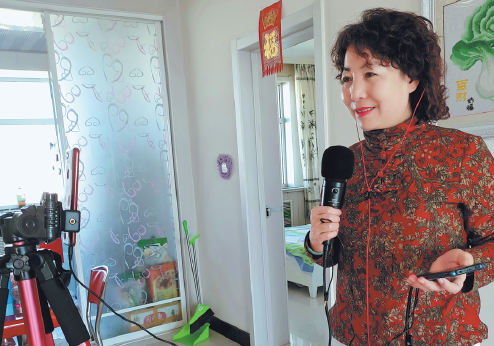Out of poverty and into the opera
(Xinhua) Updated: 2020-01-08 00:00TAIYUAN-Guo Wenying slips into her costume, dons a headset, tests her microphone and belts out a traditional local opera in front of her 34,000 online followers.
Guo, 57, is a farmer in Loufan county, Shanxi province. The county was mired in poverty for decades and only recently said farewell to financial hardship.
"I was just making ends meet and didn't have the time and energy to focus on music," Guo said. "But I did want to stick with my hobby, which is singing and performing the Shanxi Daoqing, a traditional opera."
The average per capita annual income in Loufan now exceeds 7,500 yuan ($1,070), according to the latest government figures. "Now I can perform every day because there are no more financial worries," she said. "I feel happy."
Since she was a child, Guo's passion for Daoqing Opera has grown. The musical form originated during the Tang Dynasty (618-907) and rural folk popularized it in the province. Performers usually wear colorful costumes and sing in local dialects.
Guo became a Daoqing performer in her village at the age of 17. She would swagger on stage and sing her heart out to the crowds during traditional festivals. "I was a cool kid," she recalled.
In the 1970s and 1980s, money was tight, and performing on its own wasn't enough to get by in a poor county like Loufan. "After I got married, I spent all my days doing chores, growing crops and taking care of my husband and kids," she said. "I simply couldn't afford to get on stage again."
For many years, she ate yams and cornmeal every day. A large mountain separates the village from the nearest town, and Guo would have to walk for up to eight hours just to buy supplies.
In 1990, when Gao was 28, farmers survived on 328 yuan a year in the county, according to the local government.
Guo's husband was the only income earner, as she had to attend to her two sons and daughter. "Life was really, really hard," she said.
As China's anti-poverty campaign gained steam, authorities in Loufan began to boost agriculture and rural tourism, liberating people like Guo from hardship.
Last year, the county officially lifted itself out of poverty.
New voice
With life improving, Guo has more time to take up her singing hobby again. This time around, she has moved her stage from the open air to the internet.
"I saw someone livestreaming on the phone once, and I quickly learned how to do it," she said.
"I used to live for others, but for the first time in my life, I feel like living for myself by livestreaming myself singing."
To improve her performance, Guo spent about 7,000 yuan on equipment, including a microphone, a stereo system and a smartphone.
"I perform in my costumes for my followers every day," she said. "They feel like family."
Sometimes she sings about Taoist stories, shares anecdotes about historical royal families and advocates benevolence.
Besides the opera, she also broadcasts herself toiling in the field and making local specialties. She livestreams even when she is traveling.
"Many people don't know what the countryside looks like, so livestreaming helps them understand," she said. "This also brings you many, many followers."
China's increasing prosperity has improved seniors' quality of life, and enhanced their self-awareness, said Xing Yuan, a professor of sociology at Shanxi University.
"Guo's story highlights their need to search for their own values and spiritual pursuits," Xing said. "It is also the result of the soaring internet economy."
Through livestreaming, Guo rakes in more than 1,000 yuan a month. Her New Year's resolution is to reach 50,000 followers.
"I want to hang out more with my friends in the opera community to improve my performing skills," she said. "I also want to take my parents to tour Shanghai."

- 'Cooperation is complementary'
- Worldwide manhunt nets 50th fugitive
- China-Japan meet seeks cooperation
- Agency ensuring natural gas supply
- Global manhunt sees China catch its 50th fugitive
- Call for 'Red Boat Spirit' a noble goal, official says
- China 'open to world' of foreign talent
- Free trade studies agreed on as Li meets with Canadian PM Trudeau
- Emojis on austerity rules from top anti-graft authority go viral
- Xi: All aboard internet express











